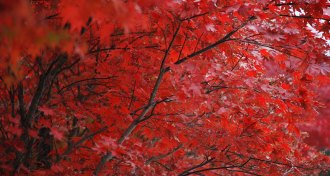
Life sciences writer Susan Milius has been writing about botany, zoology and ecology for Science News since the last millennium. She worked at diverse publications before breaking into science writing and editing. After stints on the staffs of The Scientist, Science, International Wildlife and United Press International, she joined Science News. Three of Susan's articles have been selected to appear in editions of The Best American Science Writing.

Trustworthy journalism comes at a price.
Scientists and journalists share a core belief in questioning, observing and verifying to reach the truth. Science News reports on crucial research and discovery across science disciplines. We need your financial support to make it happen – every contribution makes a difference.
All Stories by Susan Milius
-
 Animals
AnimalsLizard’s Choice: Mating test pits physique versus domain
When she decides to move in, is it him or is it his real estate?
-

Red Snow, Green Snow
It's truly spring when those last white drifts go technicolor as algae bloom in the snow.
-

Bdelloids: No sex for over 40 million years
Researchers find the strongest evidence yet for creatures that have evolved asexually for millions of years.
-

Ant cheats plant; plant cheats back
An Amazonian tree grows little pouches on its leaves to invite ants to move in and provide guard duty, but the tree drops the pouches from old leaves because ants ravage the flowers.
-
 Animals
AnimalsFish Fraud: Cleaners show off before biting clients
Some of the reef fish that make their living by nibbling parasites off other fish may be luring clients into scams by offering free massages.
-

Invaders can conquer Africanized bees
Bees that can take over even an Africanized-bee colony start by conning their nursemaids into giving them royal treatment.
-

Buddy power warms tent caterpillars
Tent caterpillars get more heat and insulation than scientists had expected.
-

Family success prompts tit divorces
For the first time, researchers have shown that bird pairs are more likely to divorce after raising young than after losing a nest of offspring.
-
 Animals
AnimalsFemale owls: First to advertise good genes
Swiss researchers find the first case of a female flashing ornaments that advertise her gene quality to choosy males.
-
 Ecosystems
EcosystemsInsects, pollen, seeds travel wildlife corridors
Strips of habitat boost insect movement, plant pollination, and seed dispersal among patches of the same ecosystem.
-

-

Ah, my pretty, you’re…#&! a beetle pile!
Hundreds of tiny, young blister beetles cluster into lumps resembling female bees and hitchhike on the male bees that they seduce.